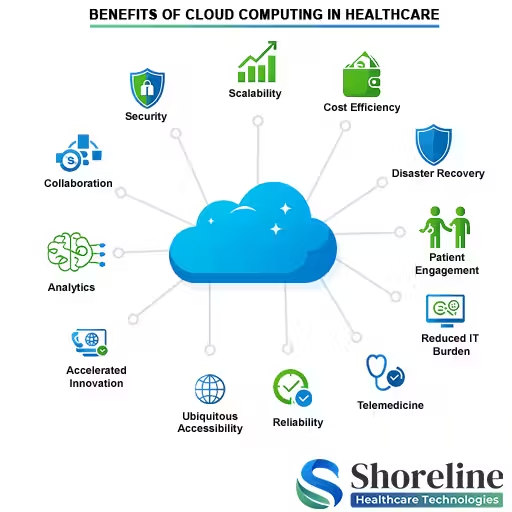Cloud Computing: The Future of Healthcare Data Management.
With the rise of digital health, value-based care, and a demanding patient population for seamless access to services, the management of healthcare data has become a pressing priority. And the conversation has shifted from "if" we should embrace technology to "how" we can do so securely and efficiently. Cloud computing has become the heart of this digital transformation enabling providers, payers, and patients to engage in secure, scalable, intelligent care delivery and unlocking a new era of flexibility. The future of healthcare data management is in the cloud. Embracing this evolution is important for the sustainability of the practice. Through this blog I take an opportunity to explore every critical dimension of cloud computing in healthcare, guiding professionals on why embracing cloud solutions is the future.
What is cloud computing and how does it work?
Cloud computing means delivering of services over the internet ("the cloud"). For examples servers, storage, databases, software etc can be accessed through global network rather than local hardware. It works by storing data and allowing users to access the shared resources via secure connections from a central provider. It is like renting a virtual warehouse for your data instead of building one.
What is a Healthcare Cloud?
A healthcare cloud is a cloud computing environment which is designed and configured specifically to meet the stringent security, privacy, and compliance requirements of the healthcare industry, such as HIPAA. It’s a secure, scalable platform for storing and processing Protected Health Information (PHI).
Healthcare cloud computing is set to surge from $54.28B in 2024 to $197.45B by 2032, growing at a strong 17.6% CAGR. (Source: Fortune Business Insights)
Why Healthcare Industry is moving towards Cloud Computing?
Healthcare organizations are moving towards cloud computing to meet the demands of massive volumes of structured and unstructured data arising from the Electronic Health Records (EHRs), diagnostic imaging, telehealth, and billing systems. The traditional model of on-site servers struggles to keep up with this "big data" and often lack the scalability and agility to manage it effectively. Cloud computing addresses these limitations with secure data storage, scalability, seamless collaboration, real-time analytics and compliance-ready frameworks which are also cost effective.
The Data Deluge: Healthcare data is projected to grow exponentially. On-premise systems simply lack the scalability to handle this.
The Need for Interoperability: With the rise in telehealth and remote patient monitoring having a secure and real-time access to patient data from across various system has become inevitable. It is important to establish a seamless communication among the healthcare providers, payers, and patients.
Cost Efficiency: Maintaining an on-premise IT infrastructure requires huge investment for hardware, physical space, and staffs. These expenses are minimized with the cloud’s pay-as-you-go model freeing up valuable resources for patient care.
The Role of Cloud Computing in Healthcare Transformation
Cloud solutions and predictive analytics are transforming the Healthcare Industry into value-based care models. Providers use the cloud platforms for supporting clinical decision, automating claims submission, and for real-time patient engagement. For billing professionals, cloud systems can reduce denials, streamline coding, and optimize reimbursements. At Shoreline Healthcare Technologies, we integrate cloud-based billing systems to ensure providers minimize revenue leakages while staying compliant with CMS rules.
The Compelling Advantages of Cloud Computing in Healthcare

Easy Access to Patient Records
Physicians traveling between facilities can easily pull out a patient’s medical history instantly without worrying about physical servers or network constraints. This eliminates the need for being tied to an on-premise system.
Fortifies Data Security
Safeguarding the patients’ health information has always been a concern for the providers. Cloud platform comes with advanced encryption and multi-factor authentication to prevents cyber-attacks.
Scalable and Flexible
Cloud resources can be rapidly scaled up or down to accommodate fluctuating workloads, raise in patient volume or the integration of new technologies.
The Foundation for Telemedicine
From secure video consults to storing medical images and maintaining patient privacy, the cloud acts as the backbone for telehealth expansion.
Cost Efficient
By using cloud services, we can significantly reduce the capital expenses needed for implementation of hardware and infrastructure.
Robust Disaster Recovery and Continuity
The data stored on cloud are geographically distributed which are backed up automatically and recovery of these data is quicker. They have lesser downtime and maintain the continuity of the business.
Improves Collaboration and data sharing
Cloud is a safe and secure platform for sharing the patient data among authorized healthcare professionals. This fosters better care coordination and multidisciplinary collaboration.
Improves Patient Engagement
Cloud based applications like patient portals and mobile health apps allows patients to actively participate in their care and access their health records.
Real-time Data Analytics and Insights
Cloud platforms can analyze large amount of data and use them for improving patient treatment plans, clinical workflows, and revenue cycle.
Reduced Burden on In-House IT Teams
Moving to the cloud systems allows healthcare organizations to free up their IT staff and make them focus on strategic initiatives that support patient care and innovation.
Accelerated Innovation
We can get to use a wide range of cutting-edge technologies and services in the cloud environment, which can be implemented by the healthcare organizations to improve their operational efficiency.
Guarantees Reliability
Cloud based solutions are reliable and offer service level agreements (SLAs) to be available for entire time without any disruptions to clinical operations.
Top Cloud Trends in Healthcare & Medical Billing (2025)
- AI-Powered Cloud Infrastructure are used for diagnosis, automating documentation, and streamlining the workflows.
- Medical IoT devices like smart implants, ventilators and wearables sends real-time data to cloud systems. This integration supports for early detection and post-op monitoring.
- FHIR standards and cloud tools allows data sharing across EHRs, labs and pharmacies.
- Cloud-Based Billing Meets RPA & NLP: Billing workflows are becoming smarter with automated robots handling claims entry, and NLP pulling coding from clinical notes. These boosts speed and reduces human error.
- Mobile Billing and mHealth Integration: Patients and providers can now manage billing directly from phones or tablets. Support for biometric security and digital wallets is simplifying payment processes.
- Advanced Analytics for Revenue Optimization: Cloud platforms are powering predictive analytics that flag patterns in claims and denials. This helps practices anticipate issues and optimize reimbursement cycles.
The Shoreline Advantage: A Partnership for the Future
As a professional who understands the financial and operational pressures on healthcare providers, I can tell you that the true power of cloud computing is realized when it’s integrated with a smart, streamlined billing process. This is where Shoreline Healthcare Technologies comes in. By outsourcing your medical billing to us, you gain a partner who can manage your revenue cycle expertly. We always ensure to use the secure, cloud-based solutions to efficiently process your claims, and see to that your revenue flow is maximized.
FAQs
Q1. What is the Relationship Between IoT and Cloud Computing?
+The IoT and cloud computing shares a symbiotic relationship. The data generated by IoT devices like wearables are analysed and stored by using the cloud-based platform and helps for real-time monitoring.
Q2. Does cloud computing ensure data security in healthcare?
+Yes. Cloud computing ensures data security by employing encryption, multi-factor authentication, and adhering to compliance standards like HIPAA, they protect sensitive patient information much better than many on-site systems.
Q3. What is FHIR?
+FHIR (Fast Healthcare Interoperability Resources) is the common standard used across electronic health records (EHRs), labs, pharmacies, billing systems, and mobile health apps to share patient data with each other in real time.
Q4. How does cloud computing improve medical billing processes?
+Cloud computing uses real-time analytics and spot issues early. It can automate claims submissions, reduces billing errors and speeds up reimbursements
Q5. Is ShorelineMB the same as Shoreline Healthcare Technologies?
+Yes, ShorelineMB.com is the official website of Shoreline Healthcare Technologies, a leading provider of medical billing and RCM services.












Partner with Shoreline Healthcare Technologies to upgrade your revenue cycle and make sure your practice is set for the digital age.